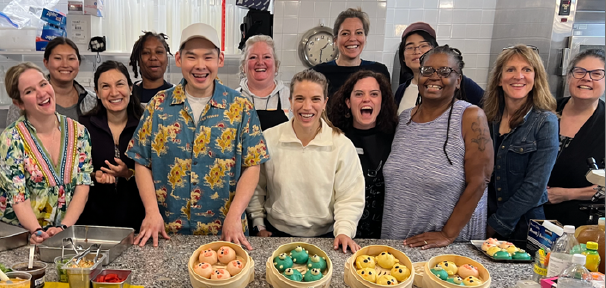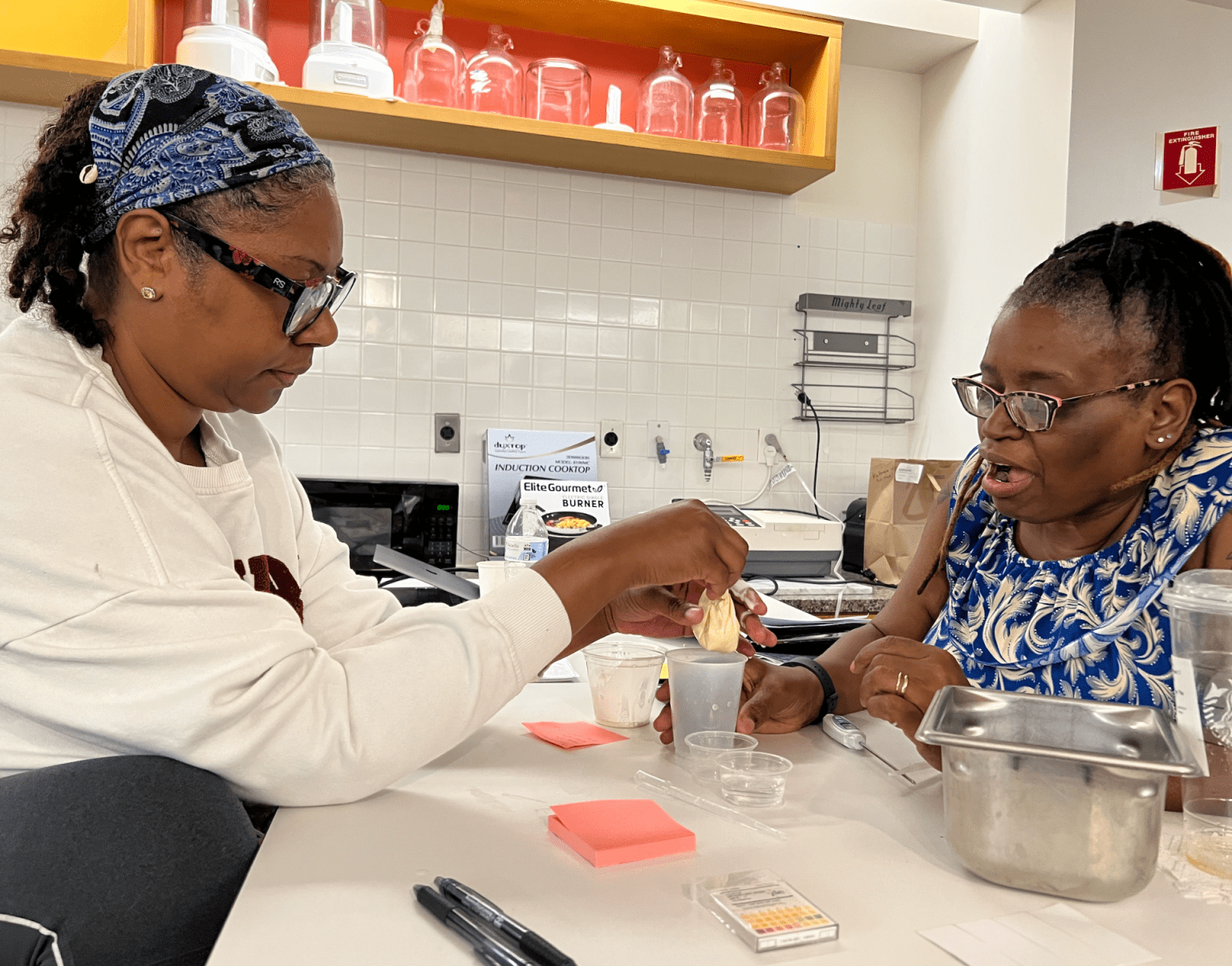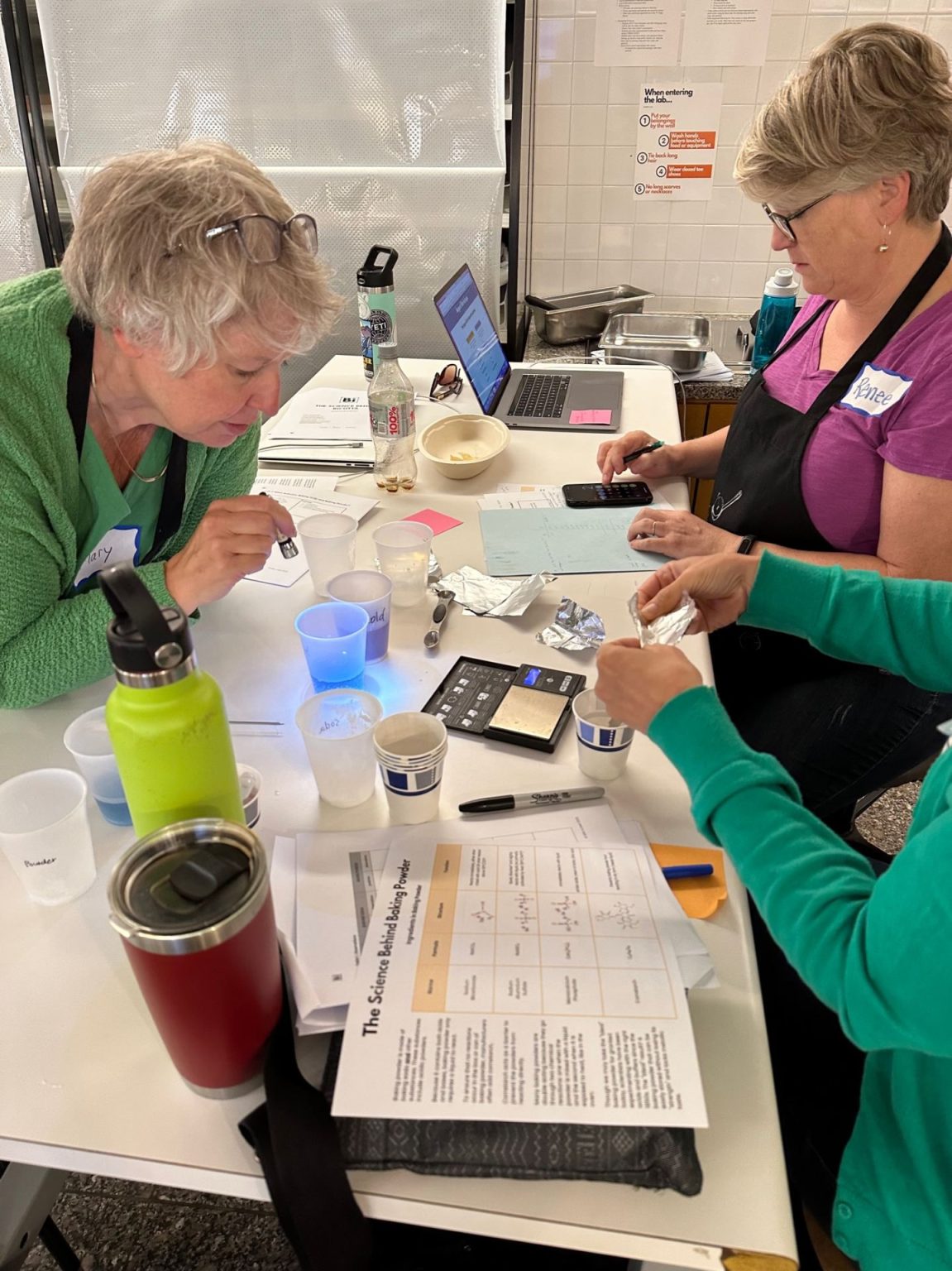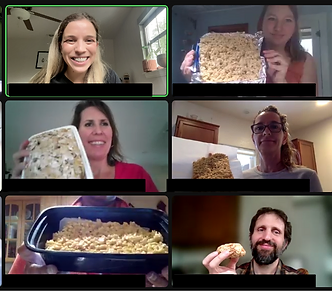Research Experience for Teachers (RET) Workshops
RET Workshops - Teacher Outreach
In collaboration with the Harvard Science and Cooking, and with Bite Scized Education, the Harvard MRSEC offers RET Workshops to facilitate teaching science concepts in middle and high school classrooms. Using food and cooking provides meaningful and safe ways to provide science lessons in the classroom that builds on science practices through experiments and student-designed investigations.
More reasons to Teach Science through Food? Food helps connect science to students' everyday lives and the world around them, which makes science learning more accessible and approachable.
The program goals intend to provide teachers with a foundation for community and support throughout the school year, and aims to teach the following points:
- Active learning opportunities to experience lessons from a student point of view
- Subject matter knowledge around the science of food and cooking (with a specific lens around concepts and practices aligned to NGSS)
- Pedagogical understanding around phenomena-based instruction, investigations, and building science practices
- Opportunities to discuss and adapt lessons to meet their students' needs
All lessons are aligned to NGSS standards and framework. Lessons show standards, as well as targeted disciplinary core ideas, crosscutting concepts, and science practices. All lessons include a CER or modeling assessment. In particular, the following standards are emphasized in lessons:
- Middle School: MS-PS1-1, MS-PS1-2, MS-PS1-3, MS-PS1-4, MS-PS1-5, MS-LS1-1, MS-LS2-1, MS-LS2-3, MS-LS2-4
- High School: HS-PS1-1, HS-PS1-2, HS-PS1-3, HS-PS1-5, HS-PS-17
The following NGSS Science Practices also heavily emphasizes:
- Asking questions
- Developing and using models
- Planning and carrying out investigations
- Analyzing and interpreting data
- Constructing explanations
- Obtaining, evaluating, and communicating information
Program Leaders
Kate Strangfeld is the Curriculum and Teacher Professional Development Lead for the Science and Cooking for Secondary Educators Program. She leads the design of instructional resources, teacher professional development workshops, and data collection and analysis. Kate taught science for 8 years in Washington, D.C. She primarily taught middle school science, as well as high school chemistry. In 2022, she received her Ed.M. from the Harvard Graduate School of Education in Learning Design, Innovation, and Technology. In 2023, she founded Bite Scized Education, an initiative to support and inspire science teachers to teach science through food. Kate has always had a passion for food and received her culinary degree in 2012 from the Natural Gourmet Institute.
Kathryn Hollar, PhD, is the Director of Community Engagement and Diversity Outreach at the Harvard John A. Paulson School of Engineering and Applied Sciences. In partnership with faculty, postdoctoral fellows, and graduate students, she develops and implements programs for K-12 students, teachers, undergraduates, and families that are designed to increase scientific and engineering literacy, and to inspire people with diverse backgrounds to pursue science and engineering careers.
Pia Sörensen, PhD, (Principal Investigator) leads Harvard's Science and Cooking Program, which includes research, teaching, and outreach programs at the intersection of science and food. The program impacts over five million learners from around the world. She co-teaches the popular general education course Science and Cooking: From Haute Cuisine to Soft Matter Science, and led its development to an online course. She also developed a popular course on the science of food fermentations. She is author and editor of several books, including the best-seller “Science and Cooking: Physics meets Food, from Homemade to Haute Cuisine” (Norton, 2020). She leads a research group studying science education, fermentation technology, and the science of food.

Science & Cooking for Secondary Science Teachers Program
This program provides middle school science and high school chemistry teachers with instructional resources and professional development to teach science through food and cooking.
Food-based lessons offer unique opportunities for students to connect science to their everyday lives and to engage in science in inclusive and relevant ways.
While food and cooking have been shown to positively impact students’ disposition toward science and develop science practices, their use in the middle and high school science classroom has not been fully explored. This program intends to research its impact while also actively engaging with teachers.
Summer Workshops for School Year 2024-2025
In this program, teachers will be provided with professional development training and instructional resources to teach science through food and cooking. This program begins with a 2-week hybrid summer workshop, as well as support through the school year.

Additional requirements for eligibility apply and can be found in the application form. Teachers who apply will be notified of their status in April. Any questions? See below for additional information, and contact scicook-k12@seas.harvard.edu with any additional questions.
Middle School General Science, June 25 - July 3, 2024
In-Person: at Harvard University: Tues, June 25 - Fri, June 28 (8:00am - 4:00pm)
Virtual: Mon, July 1 - Wed, July 3 (9:00 - 10:00am on Zoom + asynchronous time)
Middle School General Science, July 9 - 19, 2024
In-Person: at Harvard University: Tues, July 9 - Fri, July 12 (8:00am - 4:00pm)
Virtual: Tues, July 16 - Fri, July 19 (9:00 - 10:00am on Zoom + asynchronous time)
High School Chemistry, July 23 - August 2, 2024
In-Person: at Harvard University: Tues, July 23 - Fri, July 26 (8:00am - 4:00pm)
Virtual: Tues, July 30 - Fri, August 2 (9:00 - 10:00am on Zoom + asynchronous time)
Application Deadline: Wednesday, April 3, 2024
Due to the hands-on nature of this experience, space is limited. Apply for the Summer 2024 Program Now
Prior RET Workshop Events
Science & Cooking Workshops for Science Educators
The workshop is a collaborative cooperation with Harvard University's MRSEC and Kate Strangfeld, Ed.M.'22. Kate has participated in Harvard's Science and Cooking Public Lecture Series and is the founder of Bite Scized Education, a company that creates curriculum, workshops, videos, and supplementary curriculum for educators and parents, that associates science lessons with food and cooking for students where the goal is to empower people to "think like a scientist."
Testimonies of Teachers Who Participated in Summer 2023 Workshops

"The workshop is super engaging, and it does a fabulous job at breaking down the content."
"It has given me a new perspective on how I want to teach chemistry. This has now made me think I should be weaving food chemistry throughout the whole curriculum and not just one unit. It can connect more with students because it’s something that they all do."
"I loved having the opportunity to network with other teachers who might have some similar student demographics and similar challenges and bounce ideas off of other people."
"I've always been interested and knew there was science behind food and cooking, but I didn't know exactly what it was or how to approach it, let alone how to implement it with students. There are so many different lessons where I say- oh my gosh- it ties into so many of my classes."
"This workshop has radically changed how I will approach teaching the content of chemistry with my students."
3-day Science & Cooking Professional Development High School Chemistry & Food Workshop
 Wed, Aug 9–Fri, Aug 11: 8am-4pm @ Harvard
Wed, Aug 9–Fri, Aug 11: 8am-4pm @ HarvardExplore a variety of NGSS-aligned topics like ionic compounds, intermolecular forces, acids and pH, and chemical reactions by making classroom-ready food labs including fresh cheese, caramel, brown butter, and popping boba.
This workshop is primarily intended for high school science chemistry teachers. Since it centers around hands-on labs and discussions, limited space is available and full participation is required. Our application form outlines the expectations for full participation in this virtual format.
Participants will earn:
- PDPs for their work
- a certificate of completion from Harvard University
- a stipend for both completion of the professional development and implementation of activity during the school year
2-day Science & Cooking Professional Development Middle School Science & Food Workshop
 Mon, Aug 7–Tue, Aug 8: 9am-3pm @ Harvard
Mon, Aug 7–Tue, Aug 8: 9am-3pm @ HarvardExplore a variety of NGSS-aligned topics like ionic compounds, intermolecular forces, acids and pH, and chemical reactions by making classroom-ready food labs including fresh cheese, caramel, brown butter, and popping boba.
This workshop is primarily intended for middle school science chemistry teachers. Since it centers around hands-on labs and discussions, limited space is available and full participation is required. Our application form outlines the expectations for full participation in this virtual format.
Participants will earn:
- PDPs for their work
- a certificate of completion from Harvard University
- a stipend for both completion of the professional development and implementation of activity during the school year
August 1, 2023
2-day Science & Cooking Professional Development Workshop
VIRTUAL
 Mon, July 31–Tue, Aug 1: Middle School; 9am-3pm on Zoom
Mon, July 31–Tue, Aug 1: Middle School; 9am-3pm on ZoomWed, Aug 2–Thur, Aug 3: High School (intended for High School Chemistry); 11am-5pm EST on Zoom
Explore a variety of NGSS-aligned topics like ionic compounds, intermolecular forces, acids and pH, and chemical reactions by making classroom-ready food labs including fresh cheese, caramel, brown butter, and popping boba.
This workshop is primarily intended for middle school science and high school chemistry teachers. Since it centers around hands-on labs and discussions, limited space is available and full participation is required. Our application form outlines the expectations for full participation in this virtual format.
Participants will earn:
- PDPs for their work
- a certificate of completion from Harvard University
- opportunities for stipends after implementation of activities
7 p.m. | 1 Oxford Street, Cambridge, MA, Science Center Hall C; and Instagram (@scicookharvard)
Contact: science_cooking@seas.harvard.edu
Kate Strangfeld (@kate_cooks, @bitescizededucation), Founder of Bite Scized Education, Former Middle School Science and Chemistry Teacher, Washington International School
*This is a special session for teachers, educators, or anyone who is interested in using food to teach science
RET Workshop News & Information
History of RET
We initiated a Research Experience for Teachers (RET) during the summer of 2000 with five teachers from local-area K-12 schools. Four of the participants taught at the high-school level in the disciplines of chemistry, biology, physics, and earth science. Our fifth RET participant is a science cluster coordinator and teaches general science to elementary students at the Horace Mann School for the Deaf in the Boston Public School system. Adam Fagan, a doctoral student under Eric Mazur, served as the RET program coordinator. Fagan, whose background is in biology, has worked with Mazur in developing Peer Instruction, and is well-versed in the ongoing gender issues studies and work on the use of science demonstrations to promote understanding of concepts. Each of the teachers were involved in laboratory studies with MRSEC researchers, pursued one of the educational topics, and participated in the "end-of-the-summer" seminar series (see REU activity). As follow-up activities to the summer RET program, the teachers are invited to bring their classes back to the Center during the academic year. A separate, supplemental proposal is being submitted to continue the RET program with most of last summer's participants hoping to return. Special efforts will be made to expand the program to teachers from the Boston Public School system.

James McNeil talks about the value of the RET and REU programs.
Click here to view a Quicktime Movie (12 MB).
